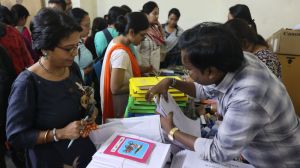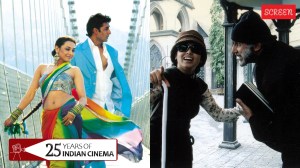Wait for a Nobel… India still not a meritocracy
Its his first visit to India since he won the 2009 Nobel Prize for Chemistry,but Professor Venkatraman Ramakrishnan walks down Marine Drive without being mobbed.....
Its his first visit to India since he won the 2009 Nobel Prize for Chemistry,but Professor Venkatraman Ramakrishnan walks down Marine Drive without being mobbed. Im not a movie star, he says,movie stars need the media and public attention,because theyve built their careers around a certain image. But for us scientists,its scarcely about an image its about the problems we like solving. Remind him of the rockstar-worthy applause his lecture in Stockholm garnered and he modestly acknowledges,It feels good.
Prof. Ramakrishnan is in town to attend Sangat 2009,Mumbais annual chamber music festival organised by the Mehli Mehta Music Foundation,where his son Raman,a cellist,and his daughter-in-law Melissa Reardon,a violist,are performing.
After spending two days in Mumbai,he will be heading to Chennai to spend some time with family and also take in some Carnatic music concerts,of which hes an enthusiastic listener. I really cherish these opportunities to listen to Carnatic music live in India,because there are so many exciting young performers I wouldnt know about in England. However,a visit to Vadodara,where he grew up,is not on this time. I just dont have the time.
Work,however,does find its way into his schedule. I am giving a lecture at the Madras University in Chennai and the reason Im doing so is because theyd approached me before I won the Nobel. So you see,it doesnt have to do with my having won awards,theyre genuinely interested in my work. For a scientist,he stresses,a prize is a way of rewarding a breakthrough,its not the culmination of his career. This breakthrough of ours has opened up new avenues to be explored. There is a whole new set of questions that requires answers.
On the subject of why Indians tend to do better when they go abroad,Ramakrishnan says,Its not just applicable to the sciences. Former President APJ Abdul Kalam pointed out that when Indians are in Singapore,theyre careful not to litter or bribe a policeman,while in their own country,theyre not quite so conscientious. But he does acknowledge that the West,and more specifically,the United States,is more conducive to excellence because the society there is meritocratic.
India is getting there slowly. People are doing excellent work here and some of their research gets published in the best science journals around the world,but these are just a few instances. The US gets a Nobel almost every year and the UK gets one every few years India will take much longer to arrive at that stage because its still not a meritocracy.
He attributes his own ability to do well in his chosen field to the freedom of choice he had as a young student. Ive been lucky to have teachers who were genuinely pleased when we solved a given problem,they didnt stress on cramming for exams. He feels the reluctance of students to opt for basic sciences is a troubling one and again here he blames societys attitude.
Parents pressure their children into opting for careers in medicine and engineering,believing that these will safeguard their future. But theres no joy there. Ramakrishnan has had first hand experience of this attitude and he narrates,Id just been admitted to medical school and I won a Physics scholarship in the National Science Talent Search Examination. I went to the office to get myself shifted to the Physics course and the clerk there couldnt believe I was voluntarily opting out of medical school. He actually called the other clerks around to share the joke.
But,he says,there must be something going right with the Indian education system. Indian students do so well abroad. The foundations laid here must be doing some good.



- 01
- 02
- 03
- 04
- 05




























